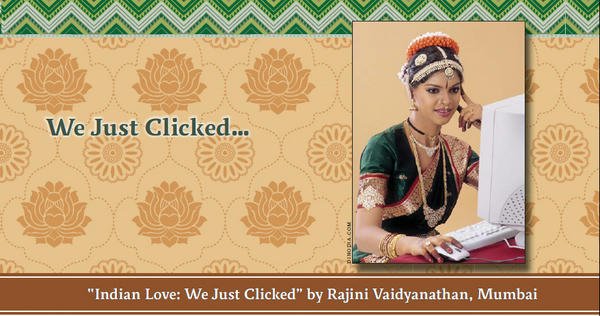
Today’s Hindu youth are seeking a perfect blend of the traditional and the modern. Culture is special to this young lady: she has adapted to technology and uses it wisely to pursue her dreams of a charmed life.§
 T ALL SEEMS SO EASY IN THE BOLLYWOOD FILMS. the characters fall in love at first sight, and despite some initial resistance from their family, it all ends happily ever after. The reality, of course, is very different. Sitting in a crowded cafe packed with young Mumbaiites, is Nik Talreja. He is, in many ways, the archetypal Bollywood hero: good looking and charming, but missing one thing—a woman by his side. Nik is just one of 15 million people in the country using the web to meet a life partner. Internet matrimonial sites are big business in India. The world’s largest, shaadi.com, was created 13 years ago, and now boasts an extra 10,000 new users every day. In fact, a key distinction between Indian matrimonial sites and those in the West is that, in India, it is often the parents who are going online to find a match for their child.§
T ALL SEEMS SO EASY IN THE BOLLYWOOD FILMS. the characters fall in love at first sight, and despite some initial resistance from their family, it all ends happily ever after. The reality, of course, is very different. Sitting in a crowded cafe packed with young Mumbaiites, is Nik Talreja. He is, in many ways, the archetypal Bollywood hero: good looking and charming, but missing one thing—a woman by his side. Nik is just one of 15 million people in the country using the web to meet a life partner. Internet matrimonial sites are big business in India. The world’s largest, shaadi.com, was created 13 years ago, and now boasts an extra 10,000 new users every day. In fact, a key distinction between Indian matrimonial sites and those in the West is that, in India, it is often the parents who are going online to find a match for their child.§
“We give freedom to our own children, they are well educated, they are brought up in a good culture,” says Arun Joshi, who is searching for a son-in-law. “The only thing we desire would be that they get married within a restricted caste and community,” he adds. His 29-year-old daughter is too busy climbing up the career ladder to find herself a husband, so Mr. Joshi has decided to help things along by submitting a profile for her online.§
In the tradition of arranged marriage, it is standard for parents and relatives to search for a match that meets a certain set of criteria. Those specifications can vary from family to family, but often include looking for someone from a similar caste, community, salary bracket and even skin color.§
Off-Line Centers
Targeting parents appears to be a key strategy for the companies behind these sites. In recent years, there has a been a rise in so-called “off-line centers” designed to bring Internet marriage to those who are rarely online. Resembling Internet cafes, with banks of computers lining the room, there are advisers on hand to help guide people through the process of creating a profile and selecting matches. For the young couples who place themselves on these sites, Internet matrimonials offer a choice which simply didn’t exist before.§
While there are many other happy stories of matches made in cyberspace, there are some people who question how progressive it is. “I don’t think it’s breaking down barriers, to tell you the truth,” says Bandhana Tewari, the fashion feature editor of Vogue, India. For Bandhana, new technology is not changing the old values, where meeting a partner by caste and background is so important. Meanwhile, she predicts that it will be a long time before people use the Internet simply for dating, rather than searching for a specific type of marriage partner. “I don’t think India has reached that level,” she says. “They still will not give up their moral stand.”§
The Traditional Way
But Gaurav Rakshit from shaadi.com argues that these sites are breaking down social barriers. One example he cites is that more than half of the people using the site do not search for a match by caste—a sign, he argues, that things are changing. “If we found those numbers were trending the other way round, we would probably have to take a very hard call, saying that we’re exacerbating such things. But right now we see them trending very nicely for us in the same way that India is evolving.”§
There are, of course, large parts of rural India where there is no Internet. But Mr Rakshit hopes to reach these parts as a long-term strategy. He claims one in ten of all registered marriages in India can be attributed to the Internet, but in five years’ time he believes this number could rise to as many as one in two. But he might have a job on his hands.§
In the village of Wana, a three-hour drive from Mumbai, where there is no Internet connection, Rathina Surjivadhi is celebrating the marriage of his daughter Anita. He found her husband Jagdish with the help of local matchmakers. He is yet to be convinced that the Internet way is better. “You need to make sure you don’t ruin the girl’s life,” he says. “If they drink or have had affairs, the Internet can’t tell you that kind of thing.”§
• • • • • • • • • • • • • • • • • • • • • • • • • • • • •
Source: BBC News, Mumbai: http://bit.ly/bPYku4
Published: 2010/03/10 © BBC§